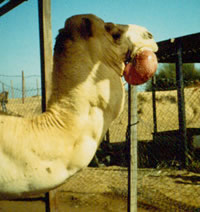February 11, 2004
Somali words for camel spit
Geoff Pullum is right to point out that Joann Loviglio's AP story on the documentation of Middle Chulym doesn't offer any evidence that their "abundance of words related to hunting and fishing, plants and flowers, weather and family relations" is different from our own, either in number or in kind. And Geoff is right to wonder why "people yearn so desperately to believe that there is some kind of incredible profusion" of revelatory terminology in exotic languages. I'll offer a partial explanation in the form of a qualified defense. The lexicon of other languages is full of thought-provoking concepts and connections. These are not more numerous or more insightful than the analogous patterns in English, but they're definitely different, and thus sometimes striking. I'll give a couple of examples from a language that is well documented and in no current danger: Somali.
 I need to
start with a bit of sex education, quoted from L. Skidmore, "Reproductive
Physiology in Male and Female Camels", in Skidmore and Adams (eds), Recent
Advances in Camelid Reproduction, International Veterinary Information
Service, Ithaca NY, (2000):
I need to
start with a bit of sex education, quoted from L. Skidmore, "Reproductive
Physiology in Male and Female Camels", in Skidmore and Adams (eds), Recent
Advances in Camelid Reproduction, International Veterinary Information
Service, Ithaca NY, (2000):
Sexual behaviour [of male camels] is also characterized by exteriorisation of the soft palate...The protrusion of the soft palate occurs all day long at intervals of 15 - 30 minutes and is accompanied by loud gurgling and roaring sounds. The protrusions become more frequent with increased excitement such as the presence of other males and females. During copulation the soft palate ejection may be replaced by grinding of the teeth and frothing at the mouth. This frothing is generally attributed to increased secretion of the salivary glands and the frequent exteriorisation of the soft palate.
The Somalis traditionally spend a lot of time with camels, so of course they've noticed this phenomenon, and named it. (And yes, there are several dozen words for "camel" in Somali, roughly like the range of English words for bos species, but that's not the point here). According to Zorc and Osman's Somali-English Dictionary, one of several Somali words for the male camel's rutting-froth is doobbo. From this is derived the verb doobbadillaacso "to reach sexual maturity (of a camel)"; dillaacso means ""to tear, crack open for oneself", so that doobbadillaacso might be etymologically glossed "to uncork one's rutting-froth", or in a more contemporary idiom "to bust a froth". Another meaning given for doobbadillaacso (and I suppose the main one for urban or diaspora Somalis) is (of humans) "to reach intellectual maturity; be capable of speaking in public".
Public oratory is a big thing in Somali culture, so to make a lexical connection between camels' rutting-froth and verbal facility is interesting. This is not an isolated lexical metaphor: according to Zorc and Osman, gulaal means "male camel unable to project the gland in his mouth; person with hesitant or stammering speech".
I'm not claiming that this lexical metaphor expresses a unique or unprecedented insight. In a way, its very familiarity ("debate == male sexual competition") is the reason it's interesting to find it in this cultural context. However, there are other Somali camel-word connections whose interest does derive from an apparently irreducible exoticism. There is a word foolbaxsi that Zorc and Osman gloss as "agitated circling movements of a pregnant camel prior to giving birth". It's clearly derived from fool "labor pains" and bax "to come out, to go out". The exotic bit comes from the verbal form foolbaxso, glossed as "to rub the oil of fried coffee beans onto one's face and body (when eating breakfast)". The mind does boggle, you have to admit.
[Warning: my knowledge of Somali is derived from teaching a one-term field methods course on it quite a few years ago, and from perusing Zorc and Osman's dictionary. I'd strongly recommend that before acting on the alleged facts presented above, the reader should check them with someone who actually knows the language. For example, maybe Zorc and Osman got a couple of index cards mixed up, and Somalis don't really think that rubbing coffee oil onto your skin at breakfast is reminiscent of the agitated circling of a camel in labor. If so, then this little fragment of lexical poetry should be credited to the goddess of chance rather than the genius of the Somali.]
[Update: a bit more poking around in Zorc and Osman reveals another fool, meaning "face; brow, forehead; front tooth, incisor". No doubt that's the fool involved in the coffee-lotion word, so that this is another example of the ubiquitous (and thus unremarkable) polysemy that John McWhorter wrote about here. The process is revealing, though: an adult learning a new language encounters all sorts of lexical relationships, both real (like "bust a froth" = "start public speaking") and accidental (like "rubbing in coffee-oil lotion" = "agitated pregnant camel"), that attract conscious attention in a way that the familiar patterns of one's native language normally don't.]
Posted by Mark Liberman at February 11, 2004 10:12 AM